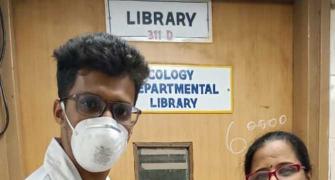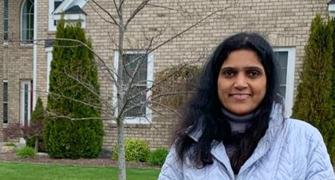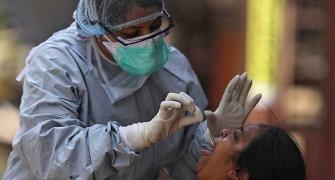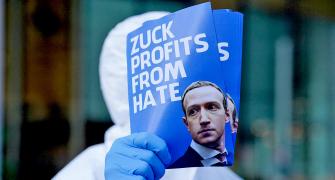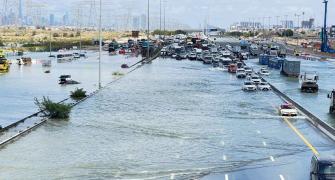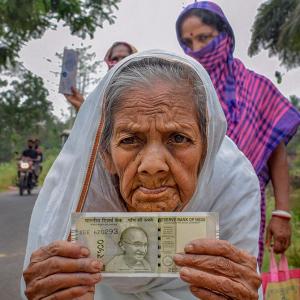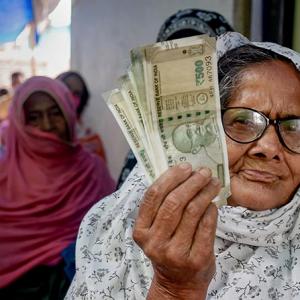'If it doesn't happen, we may be in for a difficult time.'
'Our biggest problem is our population and the fact we are a very social people.'
'However, I would say two months is more than enough time for things to settle down.'

"The virus is not going to disappear after the lockdown is lifted so we must continue to be careful and maintain social distancing, handwashing and wearing masks," Dr John Thomas Ramapuram, who spearheads Dakshina Kannada district's fight against coronavirus, tells Rediff.com's Savera R Someshwar in the concluding segment of a two-part interview.
Despite the many weeks that have passed, the medical staff on the forefront of this fight against the virus still don't have enough masks or personal protection equipment (PPE).
Testing facilities are still woefully inadequate so they may be exposed to the virus because the patient is yet to be tested or the results are being awaited.
How does that make you feel and how do you keep your team's morale up?
This is a very important question that you have asked.
Our duty is to make sure that PPEs are given to all those who directly deal with Covid-19 patients.
If we cannot provide protection to our own people, we cannot ask them to work in such conditions. That's what I believe.
We have given an oath to our staff guaranteeing them the PPEs.
We have managed to get some PPEs from whichever sources available, though it has been a struggle.
We are being very judicious in using the PPEs since we don't want to waste our resources.
We have identified what kind of PPE is to be used in which section of the hospital. Different PPEs are to be used in different places.
We are also looking at options of re-using the PPEs. We want to use every available way to utilise it for the best possible result.
In our district, we have been very closely monitoring that.
As of now, we have sufficient PPEs because, as I told you, our numbers are very limited.
We also inspect the quality of the PPE. If it is not good, we don't accept it.
Many doctors, nurses and other health care professionals at the forefront of the fight against the coronavirus are facing personal struggles like being discriminated against.
They also face the fear that they might get infected while taking care of positive patients.
How are you tackling this situation?
This is another important question.
We have faced this problem in Mangaluru. It is one of the worst things that happened to us.
Some of our staff and post-graduate students have been told to vacate their rented accommodation by their landlords.
Some of the doctors could not go back home at night. They had to sleep in the hospital for a few days.
I do not understand how people can behave like this in times of crisis. Making people (the landlords) understand what they were doing was wrong was one of our biggest challenges.
We are caring for people who are not keeping well; we should not be penalised for that by being kicked out of the place where we are staying.
It is very sad that such a thing should happen to us.
When somebody cares for you, you also need to show that you care for them.
We are working closely with the district authorities. They took serious steps against such actions and told them sternly that this kind of discrimination would not be tolerated.
Since then, we have not faced any such problem.
What are the safety procedures you have in place before your staff steps out of the hospital?
The moment a doctor or staff nurse who is supposed to treat a COVID-19 patient steps into the hospital (besides sanitising their hands and getting their temperature checked), they remove their street clothes and wear OT scrubs.
When they go to their wards, they wear a PPE.
They only work in these wards for six hours; then they are relieved of their duty.
In our hospital, they work for three days like this. Then they are given three days off so that they can relax.
The moment they finish their work, they have to take a shower and completely sanitise themselves. Only then do they wear their street clothes.
There are particular locations where they drop off their OT scrubs and PPEs.
We have provided accommodation and food for those who don't want to go back home because they have elderly parents or young children or any other personal reason.
Most, however, prefer to go back home. They maintain self-quarantine there and don't get too close to their families so that, in case they are infected despite these precautions, they should not infect their family members.
If they have invalids in their family, we tell them to be particularly careful and not go near them at all.
There have reports that 1 to 3 per cent of the population can succumb to the virus, but what the estimates of how many can actually be infected?
If one refers to the mathematical calculations given by the Centers for Disease Control at Atlanta, USA, and WHO, it can be anywhere between 20 and 60 per cent of the population.
So, when you apply 60 per cent to India, it is a frighteningly huge number -- around 70 crores (700 million).
But you must remember that 80 per cent of those infected will not have any problem at all. They may have a mild sore throat and little bit of a cold for a few days and then it disappears. They will not even know they had it.
Twenty per cent may have slightly more severe symptoms and go to a hospital.
Of these, 10 per cent may require to be admitted. Of that, five per cent may become serious.
And of that 1 to 3 per cent can end up in difficulty.
That sounds a bit overwhelming.
This disease is like a common cold; it comes from the same virus family.
How many people die of common cold?
The difference between HIV, H1N1 and this virus is that COVID-19 gets transmitted from one person to the other very swiftly.
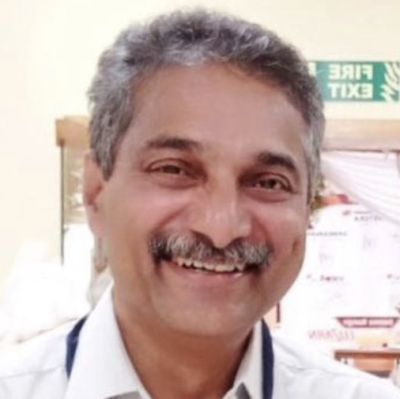 If you take the three simple precautions that everyone now knows, I don't think it's anything to worry.
If you take the three simple precautions that everyone now knows, I don't think it's anything to worry.
I'd like to repeat them here.
First, maintain social distancing.
Second, wash your hands regularly and don't bring your hands anywhere near your face.
Third, wear a mask. This is very important, not to protect oneself, but to protect others.
Since masks are a rare commodity these days, people wrap dupattas or tie handkerchiefs around their faces. How effective is this as a means of protection?
The biggest advantage of wearing a mask is that you will not spread the disease.
You don't need a layered or N95 mask. In fact, I would say an N95 mask should not be used by anyone other than healthcare professionals.
You can make a mask at home. Or you can wear a handkerchief as a mask. Or use a dupatta. This is good enough to prevent the transmission of the disease from that person to another person.
The basic thing is to follow cough etiquette.
If I have a cough or if I sneeze, and I have an infection, it spreads.
If I wear a mask, it does not spread. Most of the droplets will settle within the mask.
Don't leave the mask/dupatta/handkerchief lying around after using it. And don't reuse it without washing it.
You don't even need Dettol or any other antiseptic lotion. Just soak in hot water for 15 to 20 minutes and wash it well.
This will get rid of any virus.
If India is not able to flatten the curve before the monsoon begins in June, what are we facing?
Well, the monsoons are two months away.
Hopefully, the curve should flatten out by then.
And if it doesn't?
That's a very difficult question that you are asking me.
We want it to flatten, no?
Will it be difficult if the curve does not flatten?
If it doesn't happen, we may be in for a difficult time.
Our biggest problem is our population and the fact we are a very social people.
However, I would say two months is more than enough time for things to settle down.
We are still learning about this disease. There are many studies being conducted across the world and many research papers are constantly providing new information.
There is much we don't know about this virus and we are learning every day.
I am glad the government has extended the lockdown.
But a lockdown is not easy. It has a huge economic impact. It poses many logistical challenges to the government.
People are fighting to survive to survive and I hope the government can continue to support them during this period.
If the lockdown had not been extended, the government would have ended up spending much more money fighting this pandemic.
What are the post lockdown measures that people should follow? The first reaction will generally be that everything is okay.
The most important thing is for people to remember and understand why a lockdown was put in place.
The virus is not going to disappear after the lockdown is lifted so we must continue to be careful and maintain social distancing, handwashing and wearing masks.
Again, I would like to reiterate that we need to wear masks more for the protection of others than ourselves.
We in India tend to come together as a crowd for any occasion. Hopefully, that will change and people will understand the importance of queues.
For how long should such measures be in place after the lockdown is lifted?
Ideally, I would say for a minimum of six months or until the transmission of the disease reduces drastically.
This disease can linger and those who have not been infected earlier can get it.
What have your learnings been over the past four weeks?
We are learning from all over the world because the Dakshina Kannada numbers are not high.
Nor have we had complicated cases or patients who have been seriously ill.
Twelve out of 13 patients who were diagnosed positive recovered and went back home. The one patient who is remaining was admitted just a few days ago.
Our knowledge about this disease is still very limited.
There are no randomised control trials that have taken place to say whether a particular drug is beneficial or not beneficial.
Even if a vaccine is discovered, it will take at least one year for it to reach the public.
Nobody knows yet why it is so infectious.
The only country that has come out with some kind of guidelines is India.
Hopefully, in a couple of weeks, we will have a clearer picture.
Finally, what does your family have to say about your frontline role in this crisis?
I have a wife and two daughters.
Though they have told me they are not worried, I sometimes see a look of worry cross their faces.
But they know what I'm doing and they always encourage me.

